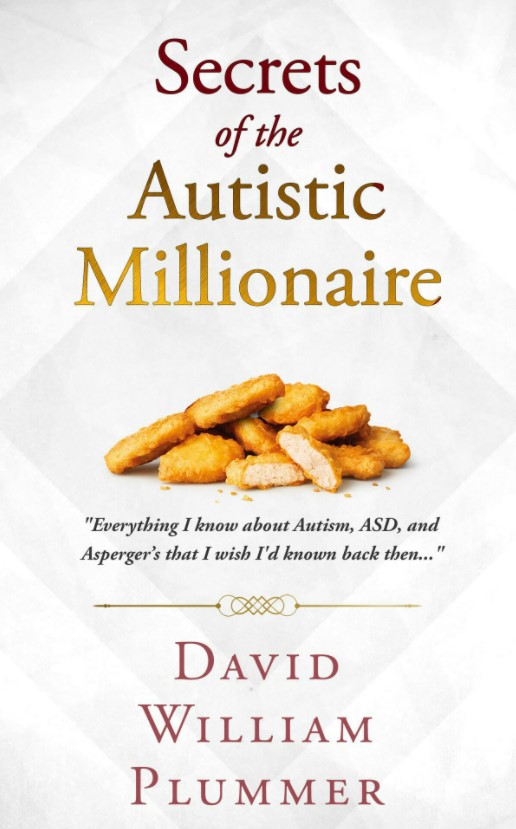This month’s Book club is very interesting, it is called
Secrets of the Autistic Millionaire
This book is written by a person in their 50s. They were diagnosed with autism much later in life and when he was going through the different testing, he has a really good experience.
And so he says
“…the good news, apparently, I’m reasonably clever.
As in three standard deviations smart on some portions of the cognitive testing, achieved perfection, something that apparently had never been seen before.
But I was also slow. I got the right answer but took my own sweet time to get it.
Each test runs to completion without you knowing the time limit.
But they watch and record where you were at when the set time limit expired. I scored 1550 out of 1600 on the S. A.T. But only if time wasn’t considered. Had I been cut off at the official time limit, I would have only scored 1150, a fairly average score.”
If you’ve ever had someone with autism in your life and you feel they are going too slow, just remember this example of how someone with autism will get there, but they’re processing things in their own way.
And just because they’re slow doesn’t mean they’re not smart.
That’s really important to remember.
This month’s Book Club is quite a lengthy book. It is certainly more than just an afternoon read. This author has four goals.
The first is to give you a better understanding of high functioning individuals with autism.
There’s certainly a lot that he talks about, a lot that he covers.
And he’s covering it from the perspective of someone who lived a good portion of his life without having the autism diagnosis.
If that is you or something you’re interested in, this is a great book for that.
The second goal is to help you understand specifically what makes some of those with autism so relentless in their pursuit of success. (that is a great goal)
The third goal is to entertain along the way, he does have quite funny stories and interesting insight and he tries to make, I would say funny analogies.
And the fourth and final goal he has here for his book is to help assure loved ones, especially any parents of children newly diagnosed with autism, that having a diagnosis in hand can make things easier.
Sometimes people are resistant to getting a diagnosis because of the way they might view it.
Or someone might be eager to get a diagnosis depending on their perspective.
The author talks a little bit about what he feels neurodiversity is.
And so he says,
“…For me, autism is best described as simple neurodiversity up until it causes unavoidable pathological outcomes.”
He says, that these outcomes certainly can be mitigated at times with reasonable accommodations to make this situation workable and that that should be explored.
However, he talks about how in some cases such accommodations are impossible or impractical.
And he goes direct quote here,
“…in those cases, if the person with autism can modify their own behavior to accommodate the circumstances, instead of vice versa, it would seem to be a reasonable alternative. To do nothing, but suffer, to be a victim of circumstance when not absolutely required just doesn’t make sense to me.”
That’s his quote.
He goes on to say how that which cannot be accommodated nor easily tolerated, rises to the level of disorder.
“There are many, many times, even in my own life, where I cannot try as I might always accommodate the circumstances. I believe that’s when autism symptoms truly become pathological and that the condition becomes a disorder. The symptoms cause unavoidable hardship that you would rather avoid. But cannot.”
He also talks about how he’s a believer in creating his own luck. And that is definitely true in the stories that he shares in his book. He really works hard, looks for opportunities, and goes for it. It’s quite inspiring!
And the last section I’ll talk about is about coordination and clumsiness and it’s a very interesting connection between those who are on the lower functioning side. Yes, we do not like that label. But in many ways, it’s descriptive when someone can’t control their bodies.
So quote here:
Fundamentally, I believe kids growing up with autism face challenges in coordinating their intent with their bodies, which manifest not only in sports but also in any area requiring fine motor control, such as handwriting. It is as if the child knows what should be done, but the hands, feet and body are not willing or able to follow along quite precisely enough.
And that is such a clear description that is often times given by someone who is lower functioning, someone who has trouble speaking, right? So you can see that coordination really does impact people on the autism spectrum. It just depends on the severity. And I think it’s really insightful that he describes this issue with coordination, right? He’s talking about a higher level of coordination like playing sports or handwriting.
There are some people who don’t have even coordination enough to speak.
There is the central theme of the person with autism has an intent, right? They know what to do.
They want to write well, they want to hit the baseball, they want to speak, right. And they have that in their brain, but it just has trouble coordinating and coming out. So I really found that insightful to hear someone so high functioning describe coordination issues that really, the more and more I speak with people on the autism spectrum, it’s universal.
This is a really great insight into just sometimes how frustrating life can be for someone who knows what they want to do but can’t make their body do it.
Overall, this is a great book. It’s really more geared towards someone who is either wondering if they themselves have autism or maybe a parent or husband or a wife might be wondering about their spouse.
So this definitely is geared more towards higher functioning and provides insights into that.
But you can find insight and inspiration for anyone with autism when you read this book, it is definitely a longer read. But if this topic interests you, I think you’ll be pleasantly pleased with reading this.





